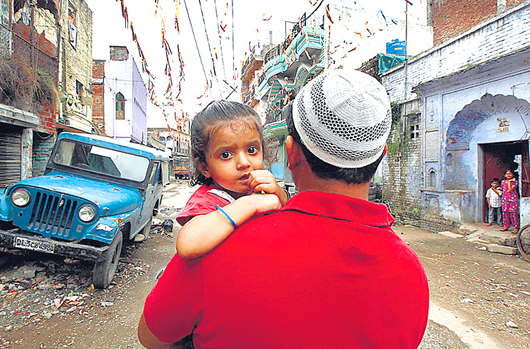
Saharanpur, Jul 29: It was a quiet gathering of around 5,000 that offered prayers at the main Idgah in Saharanpur under the hawk eye of the top administrators in the riot-torn city.
Curfew was relaxed in parts of the district from 7am to 11am on the occasion of Eid. However, curfew will be in place on Ambala Road, the main access route to the Idgah, where rioters torched dozens of shops, vehicles, and even a fire station.
Authorities will allow people to come out again between 3pm and7pm.
After offering Eid's namaz, people went back in silence as the administration didn't allow anyone to stay there for long.
District authorities decided late on Monday to disallow people in large numbers to congregate at the Idgah, because of tension in the area following communal riots on Saturday.
Local Muslims were keen on praying at the Idgah despite an uneasy calm in the area after the bloody clashes between Sikhs and Muslims last week left three people dead and several injured.
In peaceful times, more than a lakh namazis come at the Idgah to offer Eid prayers, with the roads leading to the Idgah packed with people.
"By allowing us to offer prayer at the Idgah, the administration has done the right thing. It will help the city to return to normalcy soon," said Shahzad Hussain.
Riots have proved to be a real dampener for children who will have to remain cooped in their houses as the city administration allowed relaxation of curfew only between 7 and 11 in the morning.
"Eid is for kids and women and they have been the most quiet this time," said Mohammad Hussain who lives near the Idgah.
Three-year-old Abu Bakar came with his father Bilal Ahmad to offer prayers at the Idgah.
"Kheer is waiting for me at home," said the child who is yet to understand the complexities of the situation.
Top city administrators lead by commissioner Tanvir Ali Zafar were present at the Idgah ground to keep an eye on the proceedings.
"The peaceful Eid namaz will go a long way to help the city return towards normalcy. We wanted to ensure that no provocative message should come out from the Idgah," said Zafar.
Zafar said once the curfew is lifted from the city, the administration will sit with elders of Sikh and Muslim community to find a lasting solution to the land dispute near the gurdwara which started it all.
Curfew was relaxed from 10am to 2pm in the new city and from 3pm to 7pm in the old town areas on Monday.
Uttar Pradesh chief minister Akhilesh Yadav on Monday assured a Shiromani Akali Dal delegation that his government was committed to provide security and justice to everyone in the state and compensation would be paid to the victims of the communal clashes.
The delegation of Punjab’s ruling party that met the CM in Lucknow urged him to provide adequate compensation to Sikhs who became victims of the violence.
While the Congress is blaming the ruling Samajwadi Party and the Bharatiya Janata Party (BJP) for the violence, SP has accused BJP and the Bahujan Samaj Party (BSP) of colluding to create unrest.
BJP, on the other hand, says the real culprit is the Akhilesh Yadav government.





Comments
Add new comment